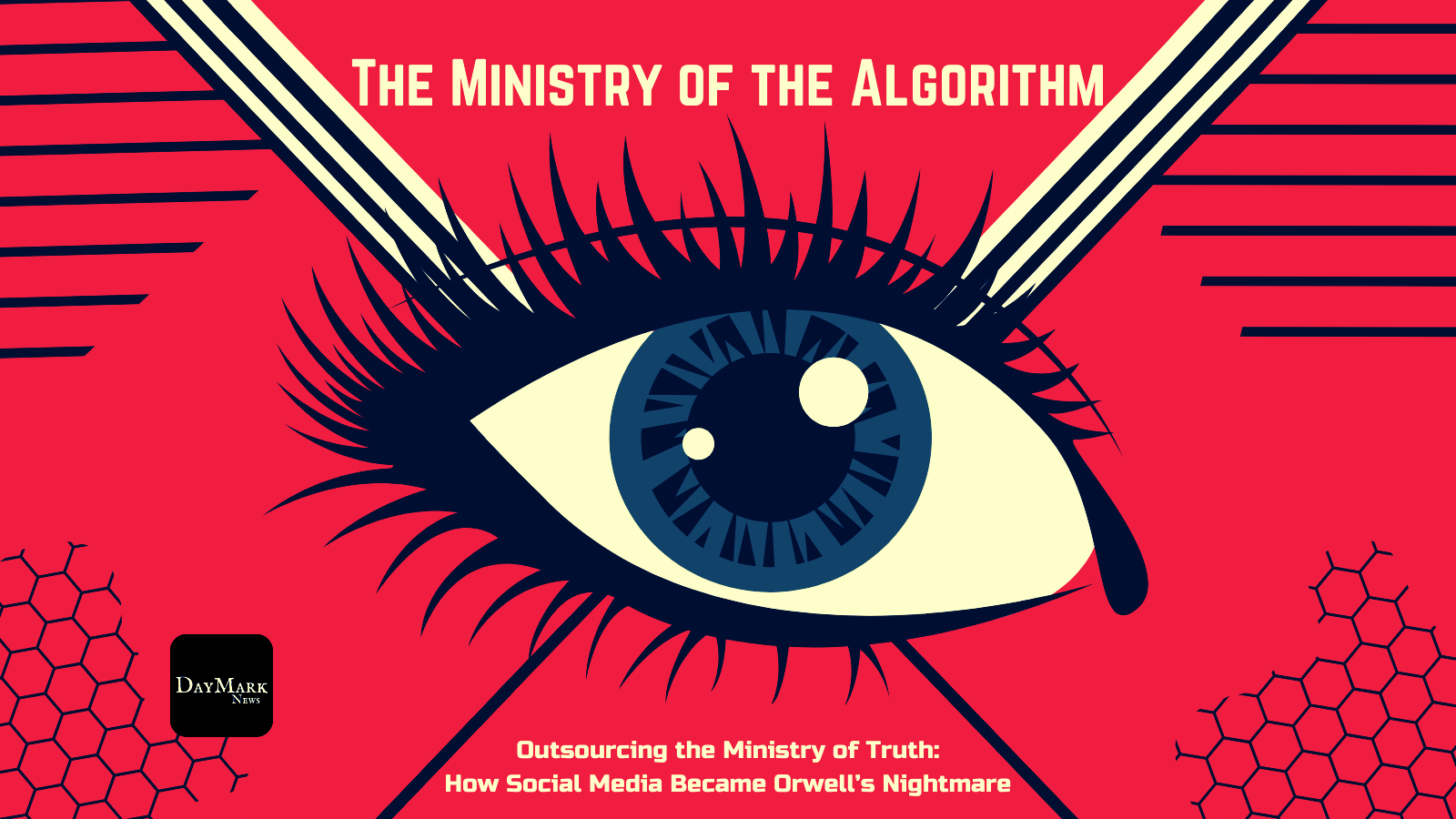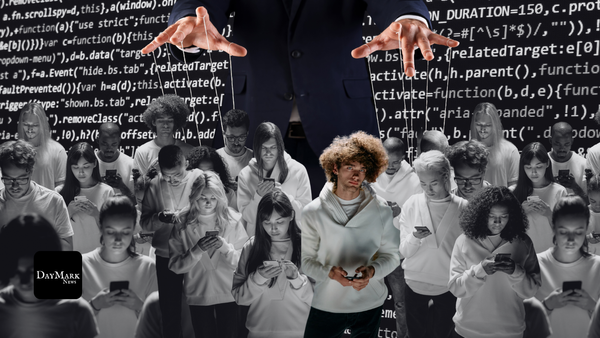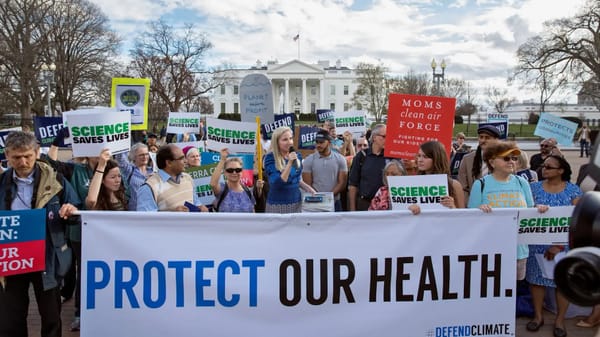Ministry of Algorithm: Social Media is Orwell’s Nightmare
Every “like,” retweet, and share feeds an algorithm that doesn’t just observe but manipulates. The grim punchline? We’re not just surveilled—we’re complicit, curating our own echo chambers and calling it free will.

By I.V. Hill | DayMark News
Meta, formerly Facebook, recently waved goodbye to its fact-checkers—a move that feels ripped straight from 1984. Twitter (or X, as Elon Musk whimsically calls it) has cozied up to the Russian "Firehose of Falsehood" propaganda model, a system that floods the public sphere with misinformation faster than a Kardashian can break the internet. If George Orwell were alive, he’d likely be shaking his head, muttering, “I told you so—but you wouldn’t listen.”
Here’s where we stand: the world’s largest social media platforms are playing fast and loose with truth. Meta’s decision to scale back its fact-checking operation came quickly less than a week ago, raising concerns about its commitment to combating disinformation. Simultaneously, X has undergone a dramatic transformation under Musk, amplifying divisive content while undercutting once-established safeguards. The parallel to Orwell’s dystopian vision of “Newspeak” and “Doublespeak” is as glaring as a propaganda poster in Airstrip One.
― George Orwell, 1984
In Orwell’s 1984, Newspeak was a linguistic guillotine, trimming the fat of free thought until rebellion was linguistically impossible. Today, Meta’s move isn’t about trimming; it’s about drowning. Instead of erasing words, they’ve let unverified content surge like floodwaters, sweeping credibility away in its torrent. The result? A sea of misinformation where facts are just buoys, barely visible, constantly at risk of being pulled under.
Here’s a sobering truth: false news doesn’t just spread; it gallops. Studies reveal it moves six times faster than verified information on social media platforms. It’s almost as if the internet itself is wired to prioritize drama over accuracy, spectacle over substance. A 2018 study published in Science analyzed over 126,000 Twitter cascades and found that falsehoods not only traveled farther but were 70% more likely to be retweeted than accurate information. Meta and X understand this dynamic—controversy drives clicks, and clicks drive revenue. Truth, meanwhile, doesn’t pay the bills.
Enter the “Firehose of Falsehood.” This propaganda model, perfected by Russia, is built on sheer volume and speed, overwhelming audiences with so many conflicting narratives that distinguishing fact from fiction becomes exhausting, if not impossible. Elon Musk’s Twitter/X has turned chaos into a business strategy. Banned accounts? Back with a vengeance. Moderation teams? Slashed. And let’s not forget the blue checkmarks for hire, elevating paid voices over credible ones. Musk’s Twitter isn’t a public square; it’s a carnival of contradictions—one that would make Orwell nod knowingly.
Orwell’s “Doublespeak” fits here like a glove. In 1984, Doublespeak blurred the line between truth and lies—war was peace, freedom was slavery. On X, bots and bad actors churn out content that rewrites reality in real time. When a verified user can claim Ukraine is the aggressor or that climate change is a hoax, and those claims get boosted into trending topics, the distinction between free speech and free-fall into chaos becomes meaningless.
Why does this matter? Because social media isn’t just a playground for memes and cat videos. It’s a critical public square, where political movements are galvanized, elections are influenced, and public opinion is shaped. A Pew Research Center report from 2021 found that 48% of Americans get their news from social media “often” or “sometimes.” When these platforms prioritize profit over integrity, they become the Ministry of Truth—only, in true capitalist fashion, outsourced. Of course, the United States would farm out this role to Meta and X, just as it uses defense contractors like Blackwater or facilities like Guantanamo Bay to sidestep constitutional constraints. After all, why bear the burden of maintaining truth when you can monetize its destruction?
A 2021 study by researchers at NYU’s Tandon School of Engineering and Université Grenoble Alpes paints an even grimmer picture of the misinformation epidemic. Between August 2020 and January 2021, publishers known for spreading false or misleading content on Facebook received six times the engagement of trusted sources like CNN or the World Health Organization. This isn’t an accident—it’s by design. Facebook’s algorithms, as the study reveals, amplify what gets clicks, and misinformation thrives because it excites, enrages, or confirms biases. Crucially, the study dispels claims of political favoritism, showing instead that the platform’s engagement-driven model disproportionately rewards misinformation-heavy outlets, many of which skew far-right. In a chilling twist, Facebook suspended the accounts of the study’s authors, ostensibly over privacy concerns, but the message was clear: challenging the algorithmic status quo comes at a price. Orwellian isn’t just a metaphor here; it’s a business model, one where facts are outbid by fictions tailored for virality.
Orwell’s darkest prediction wasn’t Big Brother’s gaze; it was our willingness to hand over the binoculars. Every “like,” retweet, and share feeds an algorithm that doesn’t just observe but manipulates. The grim punchline? We’re not just surveilled—we’re complicit, curating our own echo chambers and calling it free will.
Is there hope? Some argue that consumers should demand better. Others believe government regulation is the answer. But even these solutions come with pitfalls. Tech platforms are global, while regulations are national. And who decides what counts as “better”? The slippery slope of censorship looms large.
Meanwhile, companies like Meta and X will argue they’re just “neutral platforms,” but neutrality in the face of disinformation is complicity. While the quote often attributed to Orwell, “In a time of universal deceit, telling the truth is a revolutionary act,” is debated as to whether he actually said it, I’m certain I once saw it on a bumper sticker in Berkeley. Regardless of its origins, the sentiment resonates: perhaps the revolution starts with individuals choosing platforms that prioritize accuracy, or with governments requiring transparency in algorithms. Maybe it’s about teaching media literacy in schools or incentivizing fact-based reporting over clickbait.
Social media’s trajectory might seem ripped from Orwell, with truth mangled and oppression lurking behind sleek interfaces. But, honestly, a better comparison might be Huxley’s Brave New World, a society lulled into submission by distractions and dopamine hits. That’s a rabbit hole for another day, though. For now, Meta’s fact-checking shrug and X’s love affair with disinformation aren’t just business moves; they’re high-stakes bets on society’s future.
The question isn’t whether we’re living in 1984. It’s whether we’re doing enough to ensure we don’t. For now, the Ministry of Truth doesn’t need to burn books—algorithms do the job just fine. And we’re the willing accomplices, endlessly scrolling, sharing, and amplifying the noise, while the truth slips away, quietly but decisively, like a whisper drowned in a cacophony.
This article is licensed under Creative Commons (CC BY-NC-ND 4.0), and you are free to share and republish under the terms of the license.
At DayMark News, we are committed to exposing the rise of authoritarianism and its threat to democracy. In a time when disinformation spreads like wildfire and democratic institutions face relentless attacks, we need your support to keep the fight alive.
Investigative journalism is our weapon against authoritarian ideologies. We delve deep to uncover the truths others would rather keep hidden, while providing actionable resources to empower individuals like you to defend our democracy.
We believe in transparency, integrity, and the power of a well-informed public. But maintaining a platform dedicated to fearless reporting and mobilization requires resources. We refuse to bow to corporate interests or compromise our mission. That's why we turn to you — our community.
Every donation, big or small, helps us continue our work. With your support, we can produce the in-depth analyses, breaking news, and educational tools needed to resist the rise of extremist movements and protect democratic values for future generations.
This fight belongs to all of us. Together, we can ensure that democracy not only survives but thrives. Please consider making a contribution today to keep DayMark News strong and independent.
Donate Now: Because Democracy Can't Defend Itself.

 Donate
Donate



